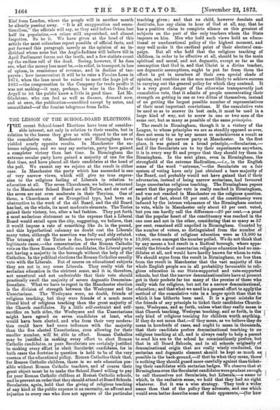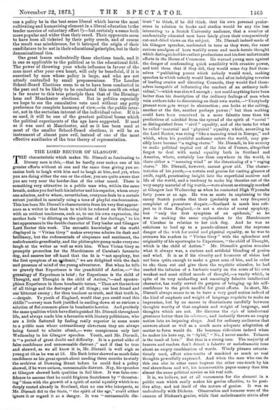THE LESSON OF THE SCHOOL-BOARD ELECTIONS.
THE recent School-board Elections have been of consider- able interest, not only in relation to their results, but in relation to the lesson they give us with regard to the use of the cumulative vote. Manchester and Birmingham have yielded nearly opposite results. In Manchester the ex- treme religious, and we may say sectarian, party have gained a completer victory than last time. In Birmingham the extreme secular party have gained a majority of one for the first time, and have placed all their candidates at the head of the poll. We cannot say we rejoice at the result in either case. In Manchester the party which has succeeded is one of very narrow views, which will give no true expres- sion to the religious feeling of Liberals in relation to education at all. The seven Churchmen, we believe, returned to the Manchester School Board are all Tories, and six out of the seven are not even moderate in their Toryism. One of them, a Churchman of an Evangelical type, had been an obstructive to the work of the old Board, and the old Board has lost, on the whole, its most moderate elements. The Tories gained their victory, too, after a bad fashion. They put forth a most audacious statement as to the expense that a Liberal Board would entail upon the city, suggesting, we believe, that it would impose a rate of something like 2s. in the pound, and this hypothetical calumny no doubt cost the Liberals many votes, although the assertion was fully and ably refuted. The triumph of the Tories is due, however, probably to a legitimate cause,—the concentration of the Roman Catholic vote on the three Roman Catholic candidates, the Liberal party not having a majority in the borough without the help of the Catholics. In the political elections the Roman Catholics usually vote with the Liberals. But of course on educational subjects they are not in any sense Liberals. They really wish for sectarian education in the strictest sense, and it is, therefore, not unnatural and not undesirable that their vote should practically swell the majority of severe dogmatic Denomina- tionalists. What we have to regret in the Manchester election is the division of strength between the Wesleyans and the Unsectarians. The Wesleyans were, no doubt, friends of religious teaching, but they were friends of a much more liberal kind of religious teaching than the great majority of the Church candidates. By a little self-restraint and self- sacrifice on both sides, the Wesleyans and the Unsectarians might have agreed on seven candidates at least, who would have been elected, and who from their very modera- tion could have had more influence with the majority than the five elected Unsectarians, even allowing for their smaller number, will be able tp effect. Roman Catholics may be justified in making every effort to elect Roman Catholic candidates, as pure Secularists are certainly justified in making every effort to elect Secularist candidates, for in both eases the doctrine in question is held to be of the very ,essence of the educational policy. Roman Catholics think that, for Roman Catholic children, there is no safe education pos- sible without Roman Catholic teachers, and of course their great object must be to make the School Board willing to pay for poor Roman Catholic children at Roman Catholic schools, and to prevent an order that they should attend at Board Schools. Secularists, again, hold that the giving of religious teaching of any kind at the public expense is an enormity, an affront and injustice to every one who does not approve of the particular
teaching given ; and that no child, however desolate and destitute, has any claim to hear of God at all, nay, that he has a positive claim to complete silence on this greatest of subjects on the part of the only teachers whom the State imposes on him. Men who hold such views hold an educa- tional or uneducational policy of the highest moment, and may well mike it the cardinal point of their electoral cam- paign. But all who hold that the religious teaching of children, in order to be effective at all, should be in the main spiritual and moral, and not dogmatic, except so far as the assumption that God is, and that Christ is a divine teacher, are dogmatic assumptions, ought to put far from them the effort to get in members of their own special shade of opinion, and combine on the men most likely to achieve success in carrying out the general policy for which they contend. It is a very great danger of the otherwise transparently just cumulative vote, that it admits of people concentrating their strength on getting in one or two dittos of themselves, instead of on getting the largest possible number of representatives of their most important convictions. If the cumulative vote be used so as to answer its best ends, it must be used in a large kind of way, not to screw in one or two men of the same sect, but as many as possible of the same principles.
The result in Birmingham, though it is a victory of the League, to whose principles we are as steadily opposed as ever, does not seem to us by any means so mischievous a result as the victory of the narrow party at Manchester. In the first place, it was gained on a broad principle,—.Secularism,- and if the Secularists are to try their experiments anywhere, it is in every way fit and proper that they should try them in Birmingham. In the next place, even in Birmingham, the stronghold of the extreme Radicalism,—i.e., in the English sense of the word "extreme,"—the Secularists on a fair system of voting have only just obtained a bare majority of the Board, and probably would not have gained that if their adversaries, instead of being narrow sectarians, had favoured large unsectarian religious teaching. The Birmingham papers assert that the popular vote is really reached in Birmingham, and was not reached in Manchester on the religious question. In point of fact, about 63 per cent. of the constituency were induced by the intense vehemence of the Birmingham contest to vote, while in Manchester only about 43 per cent. voted, but you can hardly call the difference-20 per cent.—a proof that the popular heart of the constituency was reached in the one case and not in the other, considering that so many as 37 per cent. remained still unpolled in Birmingham. Counted by the number of voters, as distinguished from the number of votes, the friends of religious education were as 13,000 to 19,000, even amongst the number polled. We do not think that by any means a bad result in a Radical borough, where appa- rently the friends of unsectarian religious education had no can- didates at all, and would have hardly known for whom to vote. We should argue from the result in Birmingham, no less than from the result in Manchester that the vast majority of the whole English people are in all probability favourable to reli- gions education in our State-supported and rate-supported schools, but that the narrow denominationalists have at present got in their pockets far too many of the proxies of those who really wish for religious, but not for a narrow denominational, education ; and that what we need is a general effort to apply the method of the cumulative vote in a larger spirit than that in which it has hitherto been used. It is a great mistake for the friends of any principle to ticket their candidates Church- men, Wesleyans, and so forth, unless what they really mean is that Church teaching, Wesleyan teaching, and so forth, is the only kind of religions teaching for children worth anything. If they do not mean that,—if they mean, as we believe they do mean in hundreds of cases, and ought to mean in thousands, that their candidate prefers denominational teaching to no religious teaching at all, and is always ready to help a parent to send his son to the school he conscientiously prefers, but that in all Board Schools, and in all schools originally of denominational origin that are really wisely conducted, the sectarian and dogmatic element should be kept as much as, possible in the back-ground,—if that be what they mean, there' is nothing they should guard more carefully against than ticket- ing their candidates with sectarian badges. We observe that at Birmingham even the Secularist candidates were prudent enough. to call themselves not Secularists, but Liberals,—a name to which, in the exclusive sense, we hold that they had no right whatever. But it was a wise strategy. They took a wider name than that of the policy they advocate, and one which would even better describe some of their opponents,—(for how
can a policy be in the beat sense liberal which leaves the moat cultivating and humanising element in a liberal education to the tender mercies of voluntary effort ?)—but certainly a name both more popular and wider than their creed. Their opponents seem to have been all ticketed by their petty creeds, and of course the result was mischievous, for it betrayed the origin of their candidature to be not in their educational principles, but in their denominational ties.
One great lesson undoubtedly these elections teach, and it is one as applicable to the political as to the educational field. The power of throwing your whole influence in favour of the man most after your own heart, will only be beneficial, if it is exercised by men whose policy is large, and who are not utterly controlled by small prepossessions. The London School-Board Elections seem to us to have been conducted in the past and to be likely to be conducted this month on what is far nearer to this true principle than that of the Birming- ham and Manchester elections. But in politics especially we hope to see the cumulative vote used .without any petty preference for complete harmony of view,—in the public inter- est, not in the sectarian interest of the individual voter. If it is so used, it will be one of the greatest political boons which the political experiments of the age have suggested. If used as it was used at Manchester, and as it has been used at most of the smaller School-Board elections, it will be an instrument of almost pure evil, instead of one of the most effective auxiliaries of the true theory of representation.



































 Previous page
Previous page